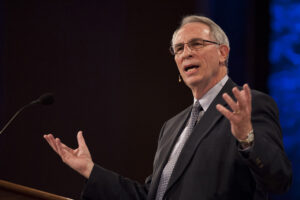
NAIROBI, Kenya (BP)–Big eyes, bulging as if they might pop out of her head, stare blankly at the mud brick wall. The emaciated woman is so weak she can’t even turn over by herself.
I sit among the pile of rags she lies on, her head in my lap, and try to offer some kind of comfort. I tell her of Jesus’ love. She listens with tears in her eyes. Finally, she manages a throaty whisper:
“I have been so bad in my lifetime that God could never forgive me…. God will never forgive me.”
I feel the hopelessness this woman expresses as she dies in my arms. I cry for the fate of my friend. She has become another African statistic for the world to lament.
World leaders gathered at the Group of Eight (G8) Summit in Scotland July 6-8 to discuss ways to aid poverty-strapped African countries. Chief among their ideas was a debt relief package totaling $55 billion, plus a promised increase in annual aid to Africa to $50 billion by 2010.
Debt relief is indeed the key for Africa. But canceling monetary debt alone is not the answer. The only true debt relief comes through Jesus Christ.
For years I’ve lived and covered stories in Africa. I’ve seen poverty, famine, disease, natural disasters and civil war. Every day, I’m confronted with the realities of starvation and impending death. Beggars line up at the window of my car asking for money to buy bread. I’ve sat talking with mothers as they fan flies from the eyes of listless, malnourished children with bloated bellies. I’ve watched friends die from AIDS-related illnesses.
I’ve witnessed or personally experienced everything that the protesters outside the G8 meeting say they are fighting against. Sure, there are days when I want to retreat back into a “Western” mindset and throw money at poverty and disease. But I know that money will not solve the greatest need in Africa.
Africans need a sense of hope. I’ve interviewed witchdoctors, village chiefs, Muslim imams, pastors, CEOs, even presidents of various countries -– and they are all searching for the same thing: the hope only Jesus Christ can give.
Great strides have been made in reaching Africa for Christ, but millions remain who have never heard the name of Jesus.
World leaders and aid activists want to bring food and education to the parts of Africa left behind by the rest of the world. Sub-Saharan Africa is in the World Bank’s lowest gross national income category of less than $765 per person per year. Africa already receives about a third of the total aid given by world governments, according to the Organization for Economic Cooperation and Development. Yet Africa is the only continent to have become poorer in the past 25 years. By the year 2000, half the world’s poor were in Africa.
The “Make Poverty History” campaign — supported by many Christian evangelicals as well as rock stars and activists — urged G8 leaders to raise an extra $50 billion in aid. Where will the money go? Most likely for food, education and disease prevention -– all vital needs. I’ve been in the famine-stricken villages when grain is delivered. The women clap and celebrate, then sit solemnly waiting for what they believe is their right. Sometimes fights break out over who receives a red plastic plate and who doesn’t.
Contrast that with the times I’ve been in a village when the Good News is introduced. When someone comes to Christ, their entire countenance changes. Celebration erupts. Often a goat is slaughtered and cooked (in African cultures, goats are worth a lot of money and only eaten to celebrate very special occasions). There is dancing and singing well into the night. Celebrations can go on for days in thankfulness for this God-given gift. They know it isn’t something they deserved, nor is it their right -– yet God provided a way.
Africans are truly humbled that their debt of sin has been paid in full by Jesus Christ.
–30–
Sue Sprenkle, the International Mission Board’s missionary correspondent for Africa based in Nairobi, Kenya, has covered the continent’s struggles — and how Christians respond to them – since 1999.















